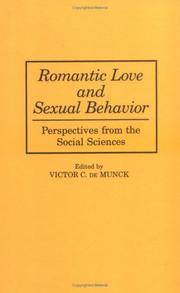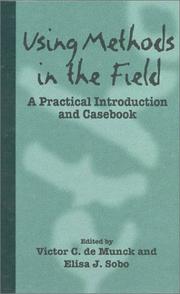| Listing 1 - 10 of 10 |
Sort by
|
Book
Abstract | Keywords | Export | Availability | Bookmark
 Loading...
Loading...Choose an application
- Reference Manager
- EndNote
- RefWorks (Direct export to RefWorks)
excorcisme --- Sri Lanka
Book
ISBN: 9781498538718 1498538711 Year: 2019 Publisher: Lanham : Lexington Books,
Abstract | Keywords | Export | Availability | Bookmark
 Loading...
Loading...Choose an application
- Reference Manager
- EndNote
- RefWorks (Direct export to RefWorks)
"Romantic Love in America: Cultural Models of Gay, Straight, and Polyamorous Relationships introduces the reader to the love and sex lives of two polyamorous, five gay, and eight straight individuals. Coupled with rich interview material, Victor C. de Munck provides a guided tour through the variable geography of love relationships as studied in the social sciences. de Munck describes evolutionary, cognitive, social, prototypical, triadic, and neural theories of romantic love and sex, concluding with an American cultural model of romantic love that also includes its relational properties as a dyad." --
Love --- Sex customs --- Sexual minorities --- Amour --- Love. --- United States.

ISBN: 0275957268 Year: 1998 Publisher: London Praeger
Abstract | Keywords | Export | Availability | Bookmark
 Loading...
Loading...Choose an application
- Reference Manager
- EndNote
- RefWorks (Direct export to RefWorks)
Westerners believe that love makes life worth living; that sex is a natural desire different in kind from love; and that only cynics reduce our love life to a calculation of economic or genetic factors. In this volume, essays explore these and other assumptions about the relationship between romantic love and sex.
Love --- Sex customs --- Cross-cultural studies

ISBN: 0761989129 0761989137 9780761989134 Year: 1998 Publisher: Walnut Creek: Altamira,
Abstract | Keywords | Export | Availability | Bookmark
 Loading...
Loading...Choose an application
- Reference Manager
- EndNote
- RefWorks (Direct export to RefWorks)
Quantitative methods in social research --- Qualitative methods in social research --- Ethnology. Cultural anthropology --- Ethnology --- Social sciences --- Anthropologie sociale et culturelle --- Sciences sociales --- Methodology. --- Méthodologie --- Methodology --- Méthodologie --- Ethnology - Methodology --- Social sciences - Methodology
Book
ISBN: 9781848859364 1848859368 Year: 2013 Publisher: London ; New York : I.B. Tauris,
Abstract | Keywords | Export | Availability | Bookmark
 Loading...
Loading...Choose an application
- Reference Manager
- EndNote
- RefWorks (Direct export to RefWorks)
Ethnology --- Anthropologie sociale et culturelle --- Macedonia (Republic) --- Macédoine (République) --- History --- Histoire --- History. --- Macédoine (République) --- North Macedonia
Book
ISBN: 0199383936 Year: 2014 Publisher: New York : Oxford University Press,
Abstract | Keywords | Export | Availability | Bookmark
 Loading...
Loading...Choose an application
- Reference Manager
- EndNote
- RefWorks (Direct export to RefWorks)
Cultural models play an important role in the generation of the individual's behaviour. A proposal is advanced to consider cultural models as fundamental units of analysis for an approach to culture that goes beyond the dichotomy between the individual (culture only in mind) and the collective (culture only in the social realm). The genesis of the concept of cultural model is traced from Kant to contemporary scholars.
Book
ISBN: 9783031481819 Year: 2024 Publisher: Cham : Springer Nature Switzerland : Imprint: Palgrave Macmillan,
Abstract | Keywords | Export | Availability | Bookmark
 Loading...
Loading...Choose an application
- Reference Manager
- EndNote
- RefWorks (Direct export to RefWorks)
This edited collection presents an agenda for the interdisciplinary study of anthropology and cognitive science. It consists of fifteen chapters written by international experts on the relationship between culture and cognition. This volume is unique in that it includes both inside (i.e., shared mental templates) and outside (i.e., extended, embedded, enactive and ecological) theories of cognition. The contributors come from the diverse disciplinary fields of anthropology, linguistics, archaeology, and cognitive science. The aim is to investigate the mental production of shared knowledge, goals, and desires around which human social life revolves. The coverage spans cultural and linguistic evolution, the importance of local histories, and the role of cultural models to understand and interact with the world. Drawing on cultural model theory, this volume is an invaluable resource for linguists, cognitive scientists, anthropologists, and other social scientists willing to explore and understand how the sharedness of culture can bond us all together across relative cultural differences and (mis)perceived divisions. Giovanni Bennardo is a Board of Trustees Professor in the Department of Anthropology and the Cognitive Science Initiative at Northern Illinois University, USA. With six book publications, a long list of articles, and many book chapters to his credit, he also edited three special issues for World Cultures, the Journal of Cultural Cognitive Science and the Journal of Qualitative Psychology. Victor de Munck is Professor of Anthropology at Vilnius University, Lithuania. His research focuses on changes in love, marriage, and family cultural models as they affect decisions to marry and have children. This current project has received funding from the Research Council of Lithuania, Grant S-MIP-21-47 (P-MIP-21-258). Stephen Chrisomalis is a Professor of Anthropology at Wayne State University in Detroit, USA. His research focuses on the anthropology of numbers and mathematics, as well as historical, comparative, and linguistic approaches to cultural models. His books include Numerical Notation: A Comparative History, Human Expeditions: Inspired by Bruce Trigger, and Reckonings: Numerals, Cognition, and History.
Cognitive science. --- Cognitive psychology. --- Social psychology. --- Anthropology. --- Philosophy of mind. --- Cognitive Science. --- Cognitive Psychology. --- Social Psychology. --- Philosophy of Mind. --- Psicologia cognitiva
Digital
ISBN: 9783031481819 9783031481802 9783031481826 9783031481833 Year: 2024 Publisher: Cham Springer Nature, Imprint: Palgrave Macmillan
Abstract | Keywords | Export | Availability | Bookmark
 Loading...
Loading...Choose an application
- Reference Manager
- EndNote
- RefWorks (Direct export to RefWorks)
Cognitive psychology --- Psychology --- Social psychology --- Ethnology. Cultural anthropology --- psychologie --- cognitieve psychologie --- antropologie --- persoonlijkheidsleer
Book
ISBN: 9781119111658 9781405187787 Year: 2016 Publisher: Chichester Wiley-Blackwell
Abstract | Keywords | Export | Availability | Bookmark
 Loading...
Loading...Choose an application
- Reference Manager
- EndNote
- RefWorks (Direct export to RefWorks)
"This new companion traces the development of cognitive anthropology from its beginnings in the late 1950s to the present, and evaluates future directions of research in the field. In twenty-nine articles from leading anthropologists, there is an overview of cognitive and cultural structures, insights into how cognition works in everyday life and interacts with culture, and examples of contemporary research. The companion is essential for anyone interested in the questions of how culture shapes cognitive processes"--
Cognitive psychology --- Philosophical anthropology --- Cultural. --- Cognition and culture. --- Ethnopsychology. --- Social science --- Anthropology
Book

ISBN: 1526169940 1526158264 1526158248 Year: 2022 Publisher: Manchester : Manchester University Press,
Abstract | Keywords | Export | Availability | Bookmark
 Loading...
Loading...Choose an application
- Reference Manager
- EndNote
- RefWorks (Direct export to RefWorks)
The works of F. G. Bailey (1924–2020) provide a seminal template for good ethnography. Central to this is Bailey’s ability to conceptually connect the well-described micro-contexts of individual interactions to the macro-context of culture. Bailey’s core concerns – the tension between individual and collective interests, the will to power, and the dialectics of social forces which foster both collective solidarity as well as divisiveness and discontent – are themes of universal interest; the beauty of his work lies in his analyses of how these play out in local arenas between real people. His models provide nuanced, yet explicit road maps to analysing the different leadership styles of everyday people and contemporary leaders. This volume seeks to inspire new generations of anthropologists to revisit Bailey’s seminal texts, to help them navigate their way through the ethnographic thicket of their own research.
Agency. --- Gluckman. --- India. --- Leaders and followers. --- Manchester School. --- Normative rules. --- Political anthropology. --- Power. --- Situational analysis. --- Transactionalism.
| Listing 1 - 10 of 10 |
Sort by
|

 Search
Search Feedback
Feedback About UniCat
About UniCat  Help
Help News
News